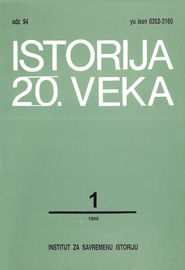JUGOSLOVENSKO-NEMAČKO DRUŠTVO U BEOGRADU 1931-1941.
THE YUGOSLAV-GERMAN SOCIETY IN BELGRADE 1931-1941
Author(s): Ranka GašićSubject(s): Cultural history, Diplomatic history, Economic history, Recent History (1900 till today), Interwar Period (1920 - 1939)
Published by: Institut za savremenu istoriju, Beograd
Keywords: Serbia; Belgrade; interwar period; Yugoslav-German society; international relations;
Summary/Abstract: The Yugoslav-German Society was founded on 21 February 1931 in Belgrade and remained active until the beginning of WWII, with the purpose of strengthening cultural and economic relations between the two countries. Reports of this association’s activity could be found almost exclusively in German sources, while the Yugoslav press followed its work only sporadically. Founded during the 6th January Dictatorship, at a time when Yugoslavia had loose political relations with Germany, the society found itself in a delicate position from the beginning. In the desire to prevent any connection with politics, the statute of the society was carefully conceived so as to determine with great precision the scope and manner of its operation. The first president and one of the founders of the society was Stanoje Stanojević, a notable historian and professor of the Belgrade University. Members of the Board and of the Advisory Committee were respectable citizens belonging to the Belgrade elite of the time, and usually stemmed from cultural or academic circles, although businessmen and politicians were also among the members. The Board’s annual reports and newspaper articles point to the society’s varied activities, which included the organization of language courses, lectures, concerts, tea-parties, receptions, performances and even a student and pupil exchange program. The role and importance of the society went through various phases during the decade of its existence. In the beginning practically a pioneer in reviving cultural and economic ties between Serbia and Germany, the society gradually became an instrument of daily politics when Yugoslavia’s political inclinations changed. Towards the end of its existence, this association entirely lost its independence as a result of the predominant German influence on Yugoslavia’s national and foreign policy.
Journal: Istorija 20. veka
- Issue Year: 1998
- Issue No: 1
- Page Range: 99-107
- Page Count: 9
- Language: Serbian

